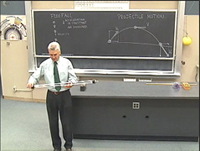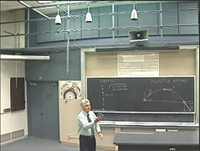
Free Fall and Projectile Motion
Feather and Coin
A feather and a small weight are dropped in a glass tube, with and without air resistance.

Click the image to watch the video
- Glass tube-feather-coin system
- Vacuum pump and hose
A feather and a coin are allowed to simultaneously begin falling from rest while inside a glass tube. In the first experiment, the tube is open to the atmosphere and the feather flutters down much more slowly than the coin. In the second experiment, the tube is evacuated of air and the feather and coin fall together.
Drop Ball and Throw Ball
A ball is dropped while another ball at the same time is thrown horizontally.

Click the image to watch the video
- Two balls
Two balls are allowed to fall simultaneously. One ball is projected horizontally, while the other is released from the same height to fall straight down. Within experimental uncertainty, their vertical motions are clearly common in that they are at the same elevation at each point in time.
Drop Objects
Different objects are released by the demonstrator as he stands on the top of the classroom table.

Click the image to watch the video
- Weights
- Hammer
- Meter stick
- A small soda can
Various objects are dropped while standing on the lecture table. Within experimental uncertainty, the acceleration due to gravity is shown to be the same for all objects (independent of mass), and for all parts of an extended object (independent of orientation or weight distribution).
Throw Ball Upward
A ball is thrown straight up and then allowed to fall straight down to the original level.

Click the image to watch the video
- Koosh ball
A ball is thrown straight upward with an estimated speed of 32 ft/s. It therefore, travels up for 1 second, coming to rest instantaneously at a maximum height of 16 ft. It is explained that the acceleration of the ball due to gravity (32 ft/s2) is constant at each point of the path, including the special point at the top where the velocity is zero.
Monkey Shoot
A hanging toy monkey is dropped and then hit by a small steel ball.

Click the image to watch the video
- Monkey shoot system
This classical experiment in projectile motion shows a toy monkey being released to fall straight down at the same instant that a blowgun propels a marble directly toward the initial position of the monkey. Monkey and the marble start falling from the same height, and they maintain a common elevation at each point in time, including the time of collision. This dramatically demonstrates that the vertical motion is independent of the horizontal motion of the ball (assuming negligible air resistance).
Projectile Motion
A ball is thrown through the air as a projectile.

Click the image to watch the video
- A koosh ball
The motion of a ball is observed as it is thrown upward and forward. It is explained that the horizontal component of velocity remains constant, while the vertical component is constantly changing due to gravity at a rate of 32 ft/s2.